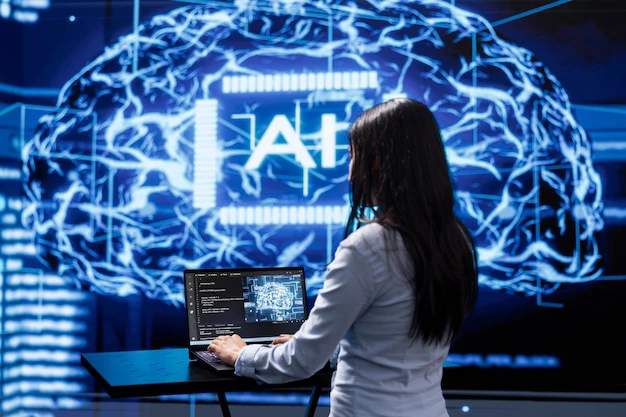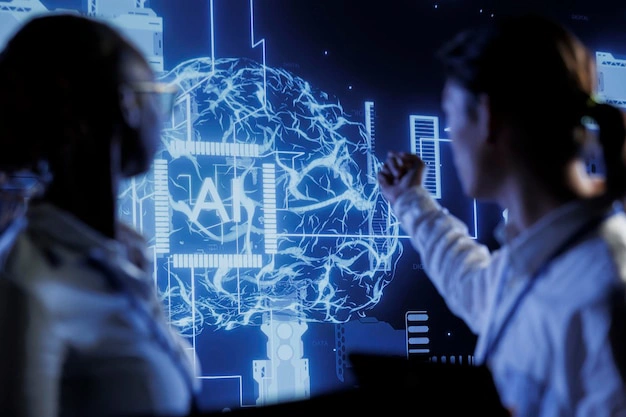AI & MACHINE LEARNING DEVELOPMENT SERVICES
Intelligent automation. Actionable insights.
500+ companies rely on our top 1% tech talent.
Yes. We cover your tech stack.
Proven track record with 500+ projects across 50+ industry sectors.
Machine Learning Development Services We Provide
Build ML models tailored to industries like healthcare, retail, and manufacturing — enabling smarter decisions and predictive insights.
Custom End-to-End Machine Learning Development
From data cleaning to deployment, we build custom ML models that improve predictions and drive business outcomes.
Machine Learning Operations (MLOps) Implementation
Keep ML models efficient and scalable with automated deployment pipelines, versioning, and performance tracking.
Data Engineering and Pipeline Development
Design robust data pipelines that process, clean, and transform your data to unlock enterprise-wide insights.
AI-Driven Product Development
Embed AI into your products — from recommendation systems to predictive analytics — for measurable impact.
Deep Learning Services
Solve complex challenges using neural networks. From vision to NLP, we deploy deep learning solutions using TensorFlow and PyTorch.
Computer Vision Services
Use custom vision systems to automate image classification, quality checks, and visual workflows.
Key Facts About Machine Learning Development
Machine learning software development services are essential for industries managing vast data sets and seeking smarter automation. These sectors rely on machine learning solutions to innovate, improve efficiency, and maintain a competitive edge:
- Healthcare: Improve diagnostics, personalize treatments, and enhance patient monitoring with AI-driven healthcare tools.
- Finance:Detect fraud, assess credit risk, and optimize investments with real-time machine learning models.
- Retail:Use dynamic pricing, customer behavior analytics, and recommendation engines to boost retail outcomes.
- Manufacturing: Reduce downtime and defects with predictive maintenance, process optimization, and smart automation.
- Transportation: Optimize route planning, improve logistics, and enable autonomous systems with real-time ML data.
- Energy and Utilities:Forecast energy demand, manage renewable grids, and enhance efficiency through smart meters and ML forecasting.
- Media and Entertainment:Enhance audience targeting, personalize content delivery, and analyze real-time engagement trends.
- Healthcare: Improve diagnostics, personalize treatments, and enhance patient monitoring with AI-driven healthcare tools.
- Finance:Detect fraud, assess credit risk, and optimize investments with real-time machine learning models.
- Retail:Use dynamic pricing, customer behavior analytics, and recommendation engines to boost retail outcomes.
- Manufacturing: Reduce downtime and defects with predictive maintenance, process optimization, and smart automation.
- Transportation: Optimize route planning, improve logistics, and enable autonomous systems with real-time ML data.
- Energy and Utilities:Forecast energy demand, manage renewable grids, and enhance efficiency through smart meters and ML forecasting.
- Media and Entertainment:Enhance audience targeting, personalize content delivery, and analyze real-time engagement trends.
A machine learning development company helps businesses achieve better outcomes and improved efficiency by leveraging the power of machine learning.
- Improved Decision-Making: Data-driven insights from machine learning solutions enable faster, more accurate decisions.
- Cost Efficiency: Automating tasks with machine learning technologies reduces operational expenses and errors.
- Scalability: Machine learning services scale effortlessly with your data and business growth, handling increasing workloads.
- Enhanced Customer Experience: Personalization and faster service delivery through ML solutions improve customer satisfaction and loyalty.
- Risk Reduction: Machine learning solutions development identifies risks early, preventing fraud, operational issues, and other disruptions.
Machine learning development services offer the tools to scale these benefits across industries, creating long-term business value.
Machine learning development is transforming how businesses operate by powering innovative applications across industries. Common use cases include:
- Predictive Analytics: Forecasting trends, demand, or customer behavior to make proactive decisions.
- Natural Language Processing (NLP): Enabling chatbots, virtual assistants, and language translation tools as part of machine learning technologies.
- Image and Video Recognition: Automating tasks like object detection, facial recognition, and medical imaging analysis.
- Recommendation Systems: Enhancing customer engagement with tailored product or service suggestions powered by ML solutions.
- Fraud Detection: Identifying suspicious activities in real-time using advanced ML development techniques.
- Autonomous Systems: Driving innovation in robotics and self-driving vehicles with cutting-edge development services.
These applications highlight the versatility of machine learning solutions and their impact on modern business operations.
Machine learning development services are reshaping industries with rapid advancements and impactful solutions. Here are some key facts:
- Data-Driven Evolution: ML solutions rely on large datasets to increase accuracy and improve performance over time.
- Neural Networks: A vital part of machine learning technologies, they mimic human brain functions to solve complex problems.
- Everyday Use: ML powers familiar tools like search engines, virtual assistants, navigation apps, and email filters.
- Growing Investment: Businesses continue to prioritize machine learning solutions development for long-term growth.
- Ethical Considerations: Developers must address challenges like bias, transparency, and data privacy in the machine learning development process.
Understanding these facts is crucial for leveraging machine learning services effectively in your organization.
Machine learning services are widely adopted by organizations to solve problems, improve operations, and drive innovation. Key users include:
- Tech Companies: Advancing AI-powered platforms and tools with cutting-edge machine learning development.
- Healthcare Providers: Using machine learning solutions for advanced diagnostics, treatment planning, and patient care.
- Financial Institutions: Preventing fraud, improving customer services, and optimizing investment strategies with ML development services.
- Retailers: Managing inventory, optimizing supply chains, and creating personalized marketing campaigns with ML solutions.
- Government Agencies: Enhancing public safety, infrastructure planning, and defense initiatives through machine learning development.
- Energy Sector: Leveraging machine learning technologies to predict energy consumption and optimize renewable energy integration.
These industries demonstrate the immense value of machine learning development services in tackling complex challenges and enabling long-term growth.
Best Practices for Machine Learning Development
Machine learning is constantly evolving, so it’s important to stay current with modern techniques and tools. As machine learning continues to advance, businesses need to adopt best practices that allow them to stay ahead and optimize their models. Here are the best practices we follow to ensure the highest quality and effectiveness of the ML solutions we deliver.
Understand the Problem
Define clear ML objectives, KPIs, and scope to ensure successful solution delivery.
Obtain and Clean the Data
Ensure data quality with accurate collection, normalization, and integrity checks.
Choose the Appropriate Model
Select the right algorithm architecture based on problem type and data behavior.
Establish Relevant Features
Engineer features that enhance prediction accuracy and model robustness.
Evaluate the Model
Use relevant metrics like accuracy, F1 score, or RMSE depending on the use case.
Part 1: Investigate the Problem Domain
The ML development process begins with outlining your requirements and the procedures for building a model to meet them. This phase includes model training so your solution can solve the problem effectively and adapt as new data is introduced.
Part 2: Hone the Machine Learning Model
Conduct Data Preprocessing
Data preprocessing involves assessing the quality of your raw data. This process includes encoding categorical variables and handling missing values.
Perform Exploratory Data Analysis (EDA)
EDA—including visualizing distributions, correlations, and anomalies—helps inform decisions about feature engineering and model selection.
Standardize the Data
Improve the stability of machine learning algorithms by normalizing or standardizing the data.
Account for Scalability
You'll need to accommodate a growing volume of data, so it's important to build the model with scalability in mind. Cloud-based solutions can help with scalability.
Evaluate and Improve the Model
Continuously assess and iteratively improve your ML model, testing it against new data to monitor its performance and adjust as necessary.
Part 3: Test the Model
Perform Bias and Fairness Testing
Assess your model for biases. We use fairness metrics and testing techniques to detect issues in predictions related to factors like gender, race, and age.
Conduct Security Testing
Identify potential vulnerabilities and implement measures to protect your data.
Test for Robustness
Evaluate how well the model handles unexpected outputs. Assess stability and perform exploratory testing to understand how the model makes predictions.
100s of companies worldwide trust us for their Machine Learning services.
Why Choose Ettla for Machine Learning Development

Top 1% of Machine Learning Talent
We hire elite ML engineers skilled in the latest frameworks and enterprise AI deployment strategies.
Customized ML Solutions
From chatbots to facial recognition, our ML projects are tailored to your business goals.
Rapid Development
Accelerate go-to-market timelines with agile, iterative ML development that never compromises on quality.
Our process. Simple, seamless, streamlined.

step 1
Discuss Your Requirements
Align on your ML problem, define success metrics, and gather initial data requirements.
step 2
Create a Plan and Assemble a Team
We define the data pipeline, choose the model type, and assemble your dedicated ML team.
step 3
Get to Work
Our team executes EDA, training, testing, and deployment with real-time reporting.
Frequently Asked Questions
What kind of applications can you build using machine learning?
What is the difference between ML and AI?
What types of problems can machine learning solve?
What are the common use cases for machine learning in business?
How does machine learning improve decision-making?
What kind of data does machine learning work with?
Can machine learning help with automation?
What industries benefit most from machine learning solutions?
Navigate
Related Articles
Looking for efficient
Machine Learning services?
See how we can help.





